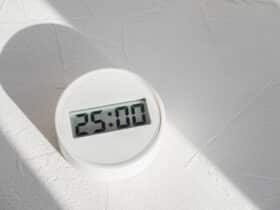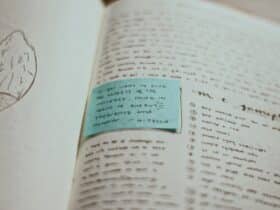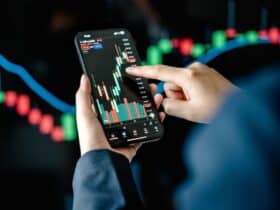Last week I mentioned that I would be going on a nightly computer “fast”, meaning that I would only be using the computer until I was done working (5-6pm), and shutting it down for the rest of the evening. And believe it or not, I actually did it. For 5 days I was able to keep my computer shut down from the evening until morning. But it was one of the hardest things I’ve ever done.
Being a web developer, I’m constantly on-line. I live and die by email, and the internet is my workplace. But the danger of having your “workplace” at home is a grave one. It’s way too easy to mix business with pleasure, especially when you use the same tools for both. I can easily let my mind fool me into thinking I “need” to get online to check my email, and pretty soon I’m cruisin’ sweet vids over at YouTube. The internet has done a beautiful job of seamlessly integrating all parts of lives into a keyboard, mouse and monitor; making it incredibly hard to stay focused and on-task while online. You have to have the mind-power of a ninja to get things done and be truly productive.
In case you haven’t figured it out by now, I’m not a ninja. That’s why I had to limit my computer usage at night. And here’s what I found when I did.
Less Is The New More
I read an article by Steve Pavlina about his theory on working less to get more done. Essentially, your mind will focus more if it knows that it only can work on something for X hours. When it knows that it doesn’t have the luxury of slacking off, it kicks it into the next gear and amazing results follow.
The same is true with my study. When I knew that the computer was going to be turned off at the same time every day, my productivity soared to new heights. Now that I only had a static, limited amount of time, I had to squeeze the most out of it. I had to plan, and only work on the most important things that had to be done that day.
By working less I also found that I was more refreshed and willing to work the next day. The anticipation of the things I got to work on was much higher. AND, I was able to plan more the night before about what I was going to do the following day. With the combination of meticulous planning and anticipation of what I “got” to do the next day, work was tons more enjoyable.
More Rest
One of the more obvious benefits of this “fast” is that I averaged almost two more hours of sleep a night. Two whole hours! I’ve written before on the benefits of sleep, but this really put the whammy on any doubts I had on its aide to my productivity. Sleep and productivity are like peanut butter and jelly, (or peas and carrots if you’re more into vegetables). They just seem to go hand in hand./p>
A Social Life?
Interestingly enough, I found that when I turned off the computer at a certain time, I was much more aware of my social life (or lack thereof). Because I knew that the ol’ compy was going to sleep at 6pm, I had about 4 more hours of true free time, without thinking about work. I could watch a movie, read a book, go to the coffee shop… whatever my little heart desired.
While this may seem like it doesn’t relate to being more productive, just hang with me for a minute. By having more social interaction or leisure time, your productivity does improve. The secret is in switching things up. By taking these much needed breaks, your mind has a chance to distance itself from the “job”. With our crazy wireless, interactive, never-turn-off-our-phones lifestyle, our work now follows us wherever we go. We are potentially always connected to everything and and everyone, including bosses, co-workers and clients. As a result: we’re less productive. By not allowing our work-life to distance itself from our personal life, our productivity goes into the fetal position and starts sucking its thumb.
Ironic, isn’t it?
Conclusions
I would recommend the PM Computer Fast to anyone. The benefits far outweight the drawbacks. In fact, the only drawback I could think of to this would be for employees or owners who absolutely need to know if something caught on fire. Otherwise, the majority of us don’t really need to check our email as often as we think we do. Most of the email I get late at night are crappy newsletters anyway.
This is really a bigger concept than just turning off my computer at night. This was my way of seperating my work life from my home life, based on the tools that I use. For others, this may mean not answering work-related calls after a certain hour. Or checking email. Just by making a conscious effort to un-connect yourself from work, you’ll immediately start seeing better results in your job.


















